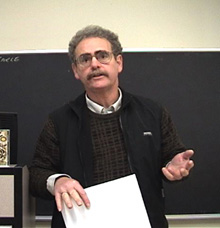For the best teachers, their own learning never stops

Barry Lazar in the classroom
Photo by Dan Noyes
When it comes to learning how to teach, Olivia Rovinescu, Director of Concordia’s Centre for Teaching and Learning Services, calls Barry Lazar a star pupil.
“I hadn’t heard that, but that’s great,” he said, with a laugh. Lazar caught the teaching bug after 20 years in radio, TV, newspapers and film. Seven years ago, he accepted an invitation to teach from Concordia’s Journalism Department.
Today, his workshop in documentary filmmaking and courses in public affairs broadcasting and literary journalism fill almost half his time; the rest is devoted to producing documentaries and writing. He has crossed the bridge from the workaday world to academia.
In an interview, he admitted, “We’re hired for our skills, but teaching requires a whole new set of skills.
“I started off as, I think, a very bad teacher. I thought all I had to do was stand up and talk, they’d take notes, I’d give them a test and that would be it.
“I found that students don’t really learn that way. I’ve evolved a sense of teaching as a collaboration between students and teacher, and I learn something in the process as well. I’ve had to learn how to teach, and that’s been quite rewarding.”
Lazar cheerfully endorses the Centre for Teaching and Learning Services. In fact, he describes it as a superb resource for teachers who want to learn. The Centre offers feedback, discussion groups and workshops on everything from course design to PowerPoint in the classroom.
Rovinescu explained that faculty members “have subject-matter expertise, but not necessarily pedagogical expertise. We’re finding that many students at Concordia, because it’s an open access university, need professors who know how to help students learn.”
She calls Lazar a natural pedagogue. He attended a three-day instructional skills workshop, a variety of other workshops and a five-day session on course design.
“He really took to the notion that you could design your teaching, find ways to speak to students’ individual needs, and find really interesting ways of motivating students. He’s been growing by leaps and bounds.
“With such a varied background, he completely redefined himself as a teacher. It’s just fascinating to watch. Now he’s going to co-facilitate some workshops. That’s where the learning really occurs, when you become a mentor for others.”
Rovinescu has taught at all levels, from elementary to university, and is teaching a new course for PhD students who are embarking on academic careers. Her passion is evident.
“I’ve always felt strongly that there’s a lot to learn about teaching,” she said. “I’m still learning.
“I look at my job as getting people talking to each other about teaching, getting them passionately engaged. It’s not so much about pedagogical theory; it’s getting people motivated to care about their students’ learning.”
CTLS gave Lazar the confidence to teach a 13-week course and the skills to approach 25 or 30 hours of lectures. For example, he has learned to use music and controversial quotes to set off discussions and provoke new ideas.
“When I walk up the steps at Loyola, I feel that it’s a privilege to teach, an opportunity not many people have,” Lazar said.
“Simply standing up there talking doesn’t provide much except a little ego-stroking. When there’s a great class, there’s really no better high. We’re working through something together, and when they feed it back to me, that’s my satisfaction.”
The following workshops are planned by the Centre for Teaching and Learning Services: Strategic Learning, March 24; Developing Questioning Skills, March 29; Teaching Dossier, in April; Rethinking Teaching: A Five-Day Course Design Workshop, May 26 - June 1.
For more information, go to the CTLS website, at
concordia.ca/ctls/workshop